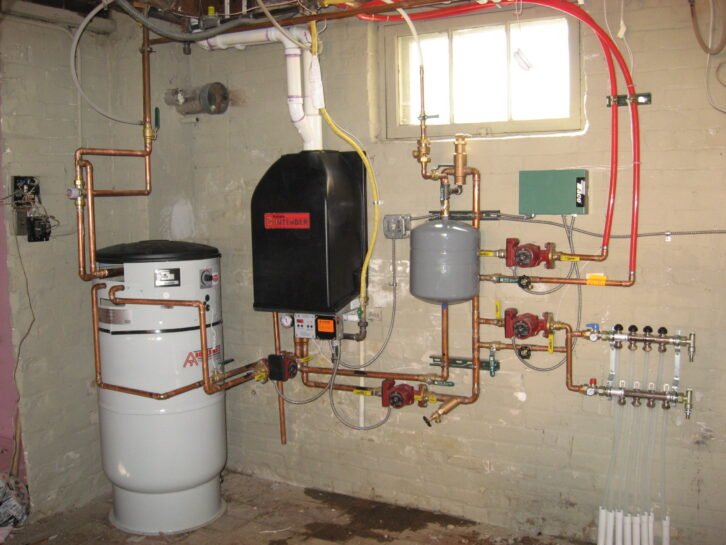Gas vs. Electric Water Heaters: Key Differences and How to Choose the Best Option
Choosing between a gas vs electric water heater can be challenging for homeowners. Both options have pros and cons, and the best choice depends on your household’s needs, budget, and local energy costs. Gas water heaters are known for their fast heating and lower operating costs, while electric water heaters are safer and easier to install. In this article, we’ll break down each type’s key differences, advantages, and disadvantages to help you make an informed decision.
Whether building a new home or replacing an old unit, understanding these options will ensure you pick the right water heater for your family. For more tips on home improvement, check out How to Make a Bedroom Accessible for Disabled Adults.
Key Differences Between Gas and Electric Water Heaters
When comparing gas vs electric water heaters, it’s essential to understand the key differences that set them apart. These differences include heating speed, energy costs, safety, and maintenance requirements. Let’s dive into these factors to help you decide which option suits your home best.
Heating Speed
Gas water heaters are known for their fast heating speed. They can heat water much quicker than electric models, so you’ll have hot water ready quickly. This is especially useful for larger households or homes with high hot water demand. On the other hand, electric water heaters take longer to heat water, which can be a drawback if you need hot water frequently throughout the day.
Energy Cost
The energy cost of running a water heater depends on your local utility rates. Gas water heaters are often cheaper to operate in areas where natural gas is affordable. However, electric water heaters may be more cost-effective in regions with lower electricity prices. It’s also worth noting that gas models typically have higher upfront installation costs, while electric units are generally cheaper to install.
Safety
When it comes to safety, electric water heaters have the upper hand. They don’t produce carbon monoxide or pose the risk of gas leaks, making them a safer option for many households. Gas water heaters, while efficient, require proper ventilation to prevent carbon monoxide buildup. Regular maintenance is essential to ensure safe operation.
Maintenance
Both gas and electric water heaters require maintenance, but gas models require extra attention. To avoid safety hazards, gas water heaters must be checked for proper venting and gas line integrity. Electric water heaters are simpler to maintain but may require occasional element replacements.
Pros and Cons of Gas Water Heaters

Gas water heaters are popular for many homeowners due to their efficiency and performance. However, like any appliance, they come with their own set of advantages and disadvantages. Let’s explore the pros and cons of gas water heaters to help you decide if they fit your home.
Pros of Gas Water Heaters
- Faster Heating Time: Gas water heaters heat water much quicker than electric models, making them ideal for households with high hot water demand.
- Lower Operating Costs: Gas water heaters can be cheaper than electric units in areas where natural gas is affordable.
- Continuous Hot Water Supply: Gas models provide a steady flow of hot water, even during peak usage times.
Cons of Gas Water Heaters
- Safety Risks: If not properly maintained or vented, gas water heaters pose risks such as gas leaks and carbon monoxide poisoning.
- Higher Installation Costs: The upfront cost of installing a gas water heater is typically higher than an electric one.
- Maintenance Requirements: Gas units require regular checks for venting and gas line integrity, adding to their maintenance complexity.
Pros and Cons of Electric Water Heaters
Electric water heaters are a reliable and safe option for many households. They are easy to install and maintain, but they also have advantages and disadvantages. Let’s examine the pros and cons of electric water heaters to help you determine if they’re the right choice for your home.
Pros of Electric Water Heaters
- Safety: Electric water heaters are safer than gas models because they don’t produce carbon monoxide or pose the risk of gas leaks.
- Ease of Installation: Electric units are generally easier and cheaper since they don’t require gas lines or venting systems.
- Energy Efficiency: Electric water heaters can be more energy-efficient and cost-effective to operate in regions with lower electricity costs.
Cons of Electric Water Heaters
- Slower Heating Time: Electric water heaters take longer to heat water compared to gas models, which can be inconvenient for larger households.
- Higher Operating Costs: Electric water heaters can be more expensive in areas with high electricity prices.
- Limited Hot Water Supply: Electric units may struggle to meet high hot water demands, especially during peak usage.
Factors to Consider When Choosing Between Gas and Electric Water Heaters
Choosing between a gas vs electric water heater depends on several factors, including your household’s needs, budget, and local energy costs. Here are the key considerations to help you make the best decision for your home.
Local Energy Costs
Operating a water heater largely depends on the price of natural gas and electricity in your area. If natural gas is cheaper where you live, a gas water heater might save you money in the long run. On the other hand, an electric water heater could be the better choice if electricity is more affordable. Be sure to compare utility rates before making a decision.
Hot Water Usage
Consider your household’s hot water needs. If you have a large family or use hot water daily, a gas water heater might be more suitable due to its faster heating and continuous supply. An electric water heater could be sufficient and more cost-effective for smaller households with lower hot water demand.
Safety Concerns
Safety is critical, especially if you have young children or elderly family members. Electric water heaters are generally safer because they don’t produce carbon monoxide or pose gas leak risks. However, if you choose a gas water heater, ensure it’s properly installed and vented to minimize safety hazards.
Installation and Maintenance
Think about the installation process and ongoing maintenance. Electric water heaters are easier and cheaper to install, while gas water heaters require gas lines and venting systems, which can increase upfront costs. Additionally, gas units need regular maintenance to ensure safe and efficient operation.
Gas vs Electric Tankless Water Heaters

Tankless water heaters are becoming increasingly popular due to their energy efficiency and on-demand hot water supply. Like traditional models, they come in both gas and electric options. Let’s compare gas vs electric tankless water heaters to help you decide which one is right for your home.
Gas Tankless Water Heaters
Gas tankless water heaters are known for their high performance and ability to provide hot water instantly, even during peak usage. They are ideal for larger households with high hot water demands. However, they require proper venting and gas lines, which can increase installation costs. Additionally, they may have higher operating costs depending on local gas prices.
Electric Tankless Water Heaters
Electric tankless water heaters are compact, easy to install, and don’t require venting or gas lines. They are an excellent option for smaller households or homes with limited space. However, they may struggle to meet high hot water demands, especially in colder climates where water takes longer to heat. Additionally, their operating costs can be higher in areas with expensive electricity.
Which is Better: Gas or Electric Tankless?
The choice between gas and electric tankless water heaters depends on your household’s needs and local energy costs. A gas tankless water heater might be the better option if you have a large family and need a continuous hot water supply. An electric tankless water heater could suit smaller households or those looking for a more straightforward installation process.
Environmental Impact
When choosing between a gas vs electric water heater, it’s essential to consider the environmental impact of each option. Both types have their ecological pros and cons, and your choice can affect your carbon footprint and energy efficiency. Let’s explore the environmental aspects of gas and electric water heaters.
Gas Water Heaters and the Environment
Gas water heaters rely on natural gas or propane, which are fossil fuels. Burning these fuels releases carbon dioxide (CO2) and other greenhouse gases into the atmosphere, contributing to climate change.
However, modern gas water heaters are more energy-efficient than older models, which helps reduce their environmental impact. Consider a high-efficiency gas model or explore renewable natural gas options if you’re concerned about emissions.
Electric Water Heaters and the Environment
Electric water heaters are often considered more environmentally friendly because they don’t produce direct emissions. However, their environmental impact depends on the source of your electricity. If your electricity comes from renewable energy sources like solar or wind, an electric water heater can be a very eco-friendly choice. On the other hand, if your electricity is generated from coal or natural gas, the indirect emissions can still be significant.
Which is Greener: Gas or Electric?
The environmental friendliness of your water heater depends on several factors, including your local energy mix and the unit’s efficiency. An electric water heater is likely the greener choice if you can access renewable energy. However, if you’re in an area where natural gas is the primary energy source, a high-efficiency gas water heater might be more sustainable.
Frequently Asked Questions (FAQs)
Here are some common questions about gas vs electric water heaters to help you better understand the differences and make an informed decision.
Which is Better: an Electric or Gas Water Heater?
The answer depends on your household’s needs and local energy costs. Gas water heaters are better for larger families with high hot water demand due to their faster heating and lower operating costs in many areas. Electric water heaters are safer, easier to install, and more energy-efficient in regions with affordable electricity.
Is gas or electricity better for heating water?
Gas is generally better for heating water quickly and efficiently, especially in areas where natural gas is affordable. However, electricity can be a better option if your electricity comes from renewable sources or you prioritize safety and ease of installation.
What is the Disadvantage of Gas Water?
The main disadvantages of gas water heaters are their higher installation costs, the risk of gas leaks, and the need for proper venting to prevent carbon monoxide buildup. They also require more maintenance compared to electric models.
Gas or Electric Water Heater: Which Should I Choose?
A gas water heater might be the better choice if you have a large household and need a continuous hot water supply. An electric water heater could be more suitable for smaller families or those prioritizing safety and ease of installation. Consider your local energy costs and environmental preferences as well.
Conclusion
Choosing between a gas vs electric water heater is an important decision that depends on your household’s needs, budget, and local energy costs. Gas water heaters are known for their fast heating speed and lower operating costs in many areas, making them ideal for larger households with high hot water demand.
On the other hand, electric water heaters are safer, easier to install, and more energy-efficient in regions with affordable electricity, making them an excellent choice for smaller homes or those prioritizing safety. Consider factors like installation costs, maintenance requirements, and environmental impact when deciding.
If you’re unsure, consult a professional to assess your home’s needs. For more insights on home systems, check out Why Use a Reducer Fitting on a Plumbing System. For more tips on home improvement and maintenance, visit This Old House. Ultimately, whether you choose a gas or electric water heater, the right choice will ensure your home has a reliable and efficient hot water supply for years.






